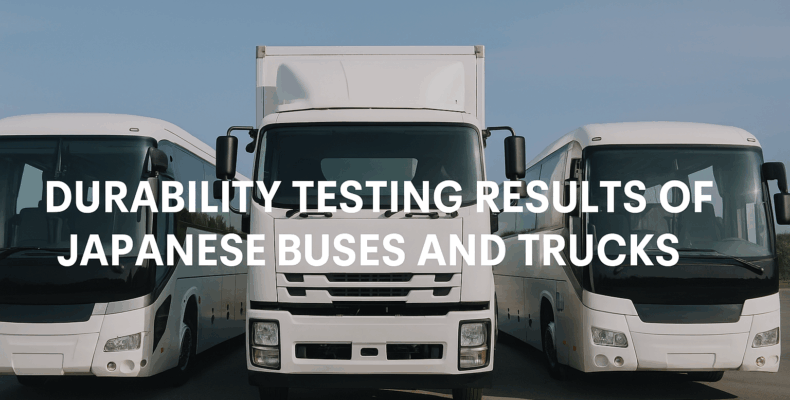Why Japanese Commercial Vehicles Are Trusted Worldwide
Durability is the cornerstone of any commercial vehicle’s success. In industries where downtime means lost revenue, reliability and long-lasting performance are critical. That’s why Japanese trucks and buses — from brands like Isuzu, Hino, Toyota, and Mitsubishi Fuso — are globally respected for surviving the harshest conditions while maintaining consistent performance.
This article explores how Japanese buses and trucks are tested for durability and why they continue to be top choices for fleets, logistics operators, and public transportation services worldwide.
1. Japan’s Stringent Durability Standards
Japanese automakers subject their commercial vehicles to extreme testing before release:
-
Endurance testing: Simulating hundreds of thousands of kilometers of use
-
Heavy load testing: Trucks and buses are tested fully loaded over steep gradients and unpaved roads
-
Vibration and frame integrity: Road conditions from around the world are recreated to measure frame fatigue
-
Engine stress tests: Constant high-rev and low-speed torque simulation
-
Weather resistance: Salt spray, heat exposure, and cold start cycles
These rigorous tests ensure Japanese trucks and buses can withstand global working environments, from tropical heat to mountain terrain.
2. Real-World Results: Mileage and Maintenance
According to long-term data:
-
Many Hino and Isuzu trucks exceed 500,000 km without major engine failure
-
Toyota Coaster buses used in fleet service often last 15–20 years with proper care
-
Mitsubishi Fuso Canters are known for smooth transmission life and strong suspension
These vehicles are built with:
-
High-tensile steel frames
-
Overbuilt powertrains
-
Easy-access maintenance layouts
-
Rust-resistant coatings
Durability also means less frequent breakdowns, lower lifetime operating costs, and higher resale value.
3. Global Popularity in Harsh Environments
Japanese commercial vehicles are exported to:
-
Africa (mining, logistics, and agriculture use)
-
South America (rugged transport over long distances)
-
Middle East (desert heat, long-haul delivery)
-
Asia-Pacific (public bus and light truck fleets)
They’re preferred for:
-
Fuel efficiency under heavy load
-
Parts availability and interchangeability
-
Ease of repair and mechanical simplicity
4. Models Known for Exceptional Durability
Hino Ranger
-
Medium-duty workhorse used globally in construction, waste management, and transport fleets
Isuzu ELF (N-Series)
-
Highly customizable light-duty truck with exceptional resale value
Toyota Coaster
-
Popular mini-bus for schools, tourism, and company fleets; known for quiet engine and comfort
Mitsubishi Fuso Canter
-
Versatile chassis options with excellent suspension durability
These models are regularly seen with 300,000–700,000+ km on the odometer and still operating daily.
Trusted Exporters of Japanese Trucks and Buses
For businesses looking to import reliable commercial vehicles, choose experienced exporters who understand fleet needs:
-
EVERY Co., Ltd. – Focused on quality Japanese exports
-
SBT Co. Ltd.
-
Be Forward
-
Qualitex Trading
-
Autorec Enterprise Ltd.
They provide auction reports, mechanical inspections, and shipping coordination for trucks and buses of all sizes.
More info:
Top Recommended Japanese Used Car Export Companies for International Customers
Final Thoughts: Built to Work, Built to Last
Japanese buses and trucks go through some of the most rigorous durability tests in the global industry — and they pass with flying colors. Whether it’s long-haul transport, city delivery, or public transport, these machines are built to last, even in the toughest conditions.
If you’re looking for reliable, road-tested commercial vehicles, Japan continues to lead the way.
